《运动解剖学》课程文献资料(脑科学)基于神经科学的道德认知研究_艾鹏
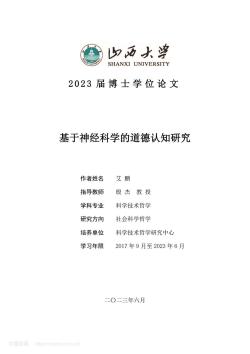
归石大学 SHANXI UNIVERSITY 2023届博士学位论文 基于神经科学的道德认知研究 作者姓名 艾鹏 指导教师 殷杰教授 学科专业 科学技术哲学 研究方向 社会科学哲学 培养单位 科学技术哲学研究中心 学习年限 2017年9月至2023年6月 二O二三年六月 中国知网htps/www.cnk.ne
2 0 2 3 届博士学位论文 基于神经科学的道德认知研究 作者姓名 艾 鹏 指导教师 殷 杰 教 授 学科专业 科学技术哲学 研究方向 社会科学哲学 培养单位 科学技术哲学研究中心 学习年限 2017 年 9 月至 2023 年 6 月 二〇二三年六月

山西大学 2023届博士学位论文 基于神经科学的道德认知研究 作者姓名艾鹏 指导教师 殷杰教授 学科专业 科学技术哲学 研究方向 社会科学哲学 培养单位 科学技术哲学研究中心 学习年限 2017年9月至2023年6月
山西大学 2023 届博士学位论文 基于神经科学的道德认知研究 作者姓名 艾 鹏 指导教师 殷 杰 教 授 学科专业 科学技术哲学 研究方向 社会科学哲学 培养单位 科学技术哲学研究中心 学习年限 2017 年 9 月至 2023 年 6 月
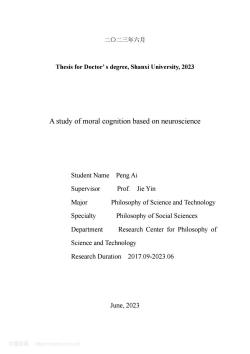
二O二三年六月 Thesis for Doctor's degree,Shanxi University,2023 A study of moral cognition based on neuroscience Student Name Peng Ai Supervisor Prof.Jie Yin Major Philosophy of Science and Technology Specialty Philosophy of Social Sciences Department Research Center for Philosophy of Science and Technology Research Duration 2017.09-2023.06 June,2023 中国知网https://www.cnk.ne
二〇二三年六月 Thesis for Doctor’ s degree, Shanxi University, 2023 A study of moral cognition based on neuroscience Student Name Peng Ai Supervisor Prof. Jie Yin Major Philosophy of Science and Technology Specialty Philosophy of Social Sciences Department Research Center for Philosophy of Science and Technology Research Duration 2017.09-2023.06 June, 2023
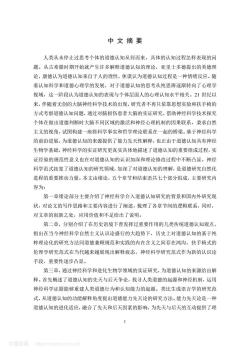
中文摘要 人类从未停止过思考个体的道德认知从何而来,具体的认知过程怎样表现的问 题。从古希腊时期开始就产生许多解释道德认知的理论,亚里士多德提出的美德理 论,康德认为道德认知来自于人的理性,休谟认为道德认知过程是一种情绪反应。随 着认知科学和道德心理学的发展,对于道德认知的思考从纯思辨逐渐转向了心理学 视域,这一阶段认为道德认知的表现与个体层面人的心理认知水平相关。21世纪以 来,伴随着无创的大脑神经科学技术的出现,研究者不再只依靠思想实验和扶手椅的 方式考察道德认知问题,通过对脑损伤患者大脑的实证研究,借助神经科学技术探究 个体在做出道德判断时大脑不同区域的激活和神经心理机制的因果联系,秉承自然 主义的视角,试图构建一座将科学事实和哲学理论联系在一起的桥梁。基于神经科学 的前沿进展,为道德认知的来源提供了能力先天性解释,也正由于道德认知具有神经 生物学基础,神经科学的实证研究更真实具体地描述了道德认知的重要组成过程,实 证经验的规范性意义也在对道德认知的认识加深和理论修改过程中不断凸显。神经 科学范式拓宽了道德认知的研究领域,加深了对道德认知的理解,是道德研究自然化 进程的重要推动力量。本文由绪论,五个章节和结束语共七个部分组成,主要研究内 容为: 第一章绪论部分主要介绍了神经科学介入道德认知研究的背景和国内外研究现 状,对论文的写作思路和主要内容进行了阐述,梳理了各章节间的逻辑联系,同时, 对文章的创新之处,应用价值和不足给出了说明。 第二章,分别介绍了在历史语境下曾发挥过重要作用的几类传统道德认知观点, 指出在当今神经科学自然主义认识论盛行的大趋势下,历史上对道德认知的基于纯 粹理论化的研究方法同道德兼顾规范和实践的内在含义之间存在鸿沟,扶手椅式的 伦理学研究范式在当代越来越展现出解释疲态,神经科学研究范式作为新的认识论 手段,重要性逐步凸显。 第三章,通过神经科学和进化生物学领域的实证研究,为道德认知的来源给出解 释。首先概述了道德认知的先天与后天争论,找寻人类道德的起源和神经机制,运用 神经科学证据能够重建人类道德行为和认知能力的起源。类比生成语言学的研究范 式,从道德认知的功能解释角度提出道德能力先天论的研究方法。能力先天论是一种 道德认知的进化适应,融合了先天和后天因素的影响,为先天与后天的互动提供了理
I 中 文 摘 要 人类从未停止过思考个体的道德认知从何而来,具体的认知过程怎样表现的问 题。从古希腊时期开始就产生许多解释道德认知的理论,亚里士多德提出的美德理 论,康德认为道德认知来自于人的理性,休谟认为道德认知过程是一种情绪反应。随 着认知科学和道德心理学的发展,对于道德认知的思考从纯思辨逐渐转向了心理学 视域,这一阶段认为道德认知的表现与个体层面人的心理认知水平相关。21 世纪以 来,伴随着无创的大脑神经科学技术的出现,研究者不再只依靠思想实验和扶手椅的 方式考察道德认知问题,通过对脑损伤患者大脑的实证研究,借助神经科学技术探究 个体在做出道德判断时大脑不同区域的激活和神经心理机制的因果联系,秉承自然 主义的视角,试图构建一座将科学事实和哲学理论联系在一起的桥梁。基于神经科学 的前沿进展,为道德认知的来源提供了能力先天性解释,也正由于道德认知具有神经 生物学基础,神经科学的实证研究更真实具体地描述了道德认知的重要组成过程,实 证经验的规范性意义也在对道德认知的认识加深和理论修改过程中不断凸显。神经 科学范式拓宽了道德认知的研究领域,加深了对道德认知的理解,是道德研究自然化 进程的重要推动力量。本文由绪论,五个章节和结束语共七个部分组成,主要研究内 容为: 第一章绪论部分主要介绍了神经科学介入道德认知研究的背景和国内外研究现 状,对论文的写作思路和主要内容进行了阐述,梳理了各章节间的逻辑联系,同时, 对文章的创新之处,应用价值和不足给出了说明。 第二章,分别介绍了在历史语境下曾发挥过重要作用的几类传统道德认知观点, 指出在当今神经科学自然主义认识论盛行的大趋势下,历史上对道德认知的基于纯 粹理论化的研究方法同道德兼顾规范和实践的内在含义之间存在鸿沟,扶手椅式的 伦理学研究范式在当代越来越展现出解释疲态,神经科学研究范式作为新的认识论 手段,重要性逐步凸显。 第三章,通过神经科学和进化生物学领域的实证研究,为道德认知的来源给出解 释。首先概述了道德认知的先天与后天争论,找寻人类道德的起源和神经机制,运用 神经科学证据能够重建人类道德行为和认知能力的起源。类比生成语言学的研究范 式,从道德认知的功能解释角度提出道德能力先天论的研究方法。能力先天论是一种 道德认知的进化适应,融合了先天和后天因素的影响,为先天与后天的互动提供了理

论阐释,为神经科学深入道德研究,使用自然主义的认识论视角探索道德认知的神经 心理机制奠定了基础。 第四章,利用神经科学的实证研究描述哪些大脑和心智能力的结构允许我们在 道德上表现出道德,阐明道德认知的神经过程和不同的心理机制。主要从理性的道德 认知、情绪的道德认知和社会互动的道德认知这三个方面具体描绘了道德认知的神 经机制。同时,实证研究对道德认知的描述间接推动了伦理学理论的发展,证明了经 验性的实证研究也具有规范的哲学意义。 第五章,建构的整合脑机制模型来对道德认知的发生提供解释,并通过分析不同 理论模型的作用机制和影响因素如何导致道德认知观的嬗变。道德认知观经历了启 发式、直觉主义、理性主义、情绪主义、双加工和复合模型进路的发展态势,主要考 察在这些认知观点下的研究者建构的认知发展理论、社会直觉理论、三位一体道德理 论、双加工理论和事件特征情绪复合模型等框架,通过分析各自框架的内容和特征, 找寻出认知观点嬗变的主要原因得益于技术的进步所导致对理论的了解不断深入, 更多的实证数据指向了更完善的理论框架。 第六章,涉及神经科学的实证研究对于哲学规范性的影响和自然主义道德认知 研究的哲学反思,主要集中在经验研究的规范性,元伦理学中自由意志和道德责任概 念在神经科学范式下的适用性以及道德判断动机内在主义和外在主义的争论。神经 科学研究范式与道德哲学存在事实和规范的差距,但是可以间接帮助规范性问题的 解决。自由意志和道德责任在神经科学自然主义的认识论视角下也有新的理论内涵, 科学实证和哲学理论相互作用促进了理论的发展。对于道德认知心理过程的实证研 究,为哲学上道德判断动机的来源提供了实证解释,神经科学的范式更支持动机外在 主义。 第七章,结语部分主要指出了自然主义社会科学研究的优势和理论意义,在通过 对神经科学范式的实证描述、功能解释和哲学反思后,提出了走向一种温和的自然主 义认识观点的展望。 关键词:道德认知:神经科学:自然主义:整合脑机制模型 中国知网https://www.cnki.ne
II 论阐释,为神经科学深入道德研究,使用自然主义的认识论视角探索道德认知的神经 心理机制奠定了基础。 第四章,利用神经科学的实证研究描述哪些大脑和心智能力的结构允许我们在 道德上表现出道德,阐明道德认知的神经过程和不同的心理机制。主要从理性的道德 认知、情绪的道德认知和社会互动的道德认知这三个方面具体描绘了道德认知的神 经机制。同时,实证研究对道德认知的描述间接推动了伦理学理论的发展,证明了经 验性的实证研究也具有规范的哲学意义。 第五章,建构的整合脑机制模型来对道德认知的发生提供解释,并通过分析不同 理论模型的作用机制和影响因素如何导致道德认知观的嬗变。道德认知观经历了启 发式、直觉主义、理性主义、情绪主义、双加工和复合模型进路的发展态势,主要考 察在这些认知观点下的研究者建构的认知发展理论、社会直觉理论、三位一体道德理 论、双加工理论和事件特征情绪复合模型等框架,通过分析各自框架的内容和特征, 找寻出认知观点嬗变的主要原因得益于技术的进步所导致对理论的了解不断深入, 更多的实证数据指向了更完善的理论框架。 第六章,涉及神经科学的实证研究对于哲学规范性的影响和自然主义道德认知 研究的哲学反思,主要集中在经验研究的规范性,元伦理学中自由意志和道德责任概 念在神经科学范式下的适用性以及道德判断动机内在主义和外在主义的争论。神经 科学研究范式与道德哲学存在事实和规范的差距,但是可以间接帮助规范性问题的 解决。自由意志和道德责任在神经科学自然主义的认识论视角下也有新的理论内涵, 科学实证和哲学理论相互作用促进了理论的发展。对于道德认知心理过程的实证研 究,为哲学上道德判断动机的来源提供了实证解释,神经科学的范式更支持动机外在 主义。 第七章,结语部分主要指出了自然主义社会科学研究的优势和理论意义,在通过 对神经科学范式的实证描述、功能解释和哲学反思后,提出了走向一种温和的自然主 义认识观点的展望。 关键词:道德认知;神经科学;自然主义;整合脑机制模型
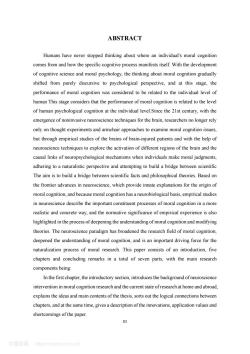
ABSTRACT Humans have never stopped thinking about where an individual's moral cognition comes from and how the specific cognitive process manifests itself.With the development of cognitive science and moral psychology,the thinking about moral cognition gradually shifted from purely discursive to psychological perspective,and at this stage,the performance of moral cognition was considered to be related to the individual level of human This stage considers that the performance of moral cognition is related to the level of human psychological cognition at the individual level.Since the 21st century,with the emergence of noninvasive neuroscience techniques for the brain,researchers no longer rely only on thought experiments and armchair approaches to examine moral cognition issues, but through empirical studies of the brains of brain-injured patients and with the help of neuroscience techniques to explore the activation of different regions of the brain and the causal links of neuropsychological mechanisms when individuals make moral judgments. adhering to a naturalistic perspective and attempting to build a bridge between scientific The aim is to build a bridge between scientific facts and philosophical theories.Based on the frontier advances in neuroscience,which provide innate explanations for the origin of moral cognition,and because moral cognition has a neurobiological basis,empirical studie in neuroscience describe the important constituent processes of moral cognition in a more realistic and concrete way,and the normative significance of empirical experience is also highlighted in the process of deepening the understanding of moral cognition and modifying theories.The neuroscience paradigm has broadened the research field of moral cognition, deepened the understanding of moral cognition,and is an important driving force for the naturalization process of moral research.This paper consists of an introduction,five chapters and concluding remarks in a total of seven parts,with the main research components being: In the first chapter,the introductory section,introduces the background of neuroscience intervention in moral cognition research and the current state of research at home and abroad explains the ideas and main contents of the thesis,sorts out the logical connections between chapters,and at the same time,gives a description of the innovations,application values and shortcomings of the paper
III ABSTRACT Humans have never stopped thinking about where an individual's moral cognition comes from and how the specific cognitive process manifests itself. With the development of cognitive science and moral psychology, the thinking about moral cognition gradually shifted from purely discursive to psychological perspective, and at this stage, the performance of moral cognition was considered to be related to the individual level of human This stage considers that the performance of moral cognition is related to the level of human psychological cognition at the individual level.Since the 21st century, with the emergence of noninvasive neuroscience techniques for the brain, researchers no longer rely only on thought experiments and armchair approaches to examine moral cognition issues, but through empirical studies of the brains of brain-injured patients and with the help of neuroscience techniques to explore the activation of different regions of the brain and the causal links of neuropsychological mechanisms when individuals make moral judgments, adhering to a naturalistic perspective and attempting to build a bridge between scientific The aim is to build a bridge between scientific facts and philosophical theories. Based on the frontier advances in neuroscience, which provide innate explanations for the origin of moral cognition, and because moral cognition has a neurobiological basis, empirical studies in neuroscience describe the important constituent processes of moral cognition in a more realistic and concrete way, and the normative significance of empirical experience is also highlighted in the process of deepening the understanding of moral cognition and modifying theories. The neuroscience paradigm has broadened the research field of moral cognition, deepened the understanding of moral cognition, and is an important driving force for the naturalization process of moral research. This paper consists of an introduction, five chapters and concluding remarks in a total of seven parts, with the main research components being: In the first chapter, the introductory section, introduces the background of neuroscience intervention in moral cognition research and the current state of research at home and abroad, explains the ideas and main contents of the thesis, sorts out the logical connections between chapters, and at the same time, gives a description of the innovations, application values and shortcomings of the paper
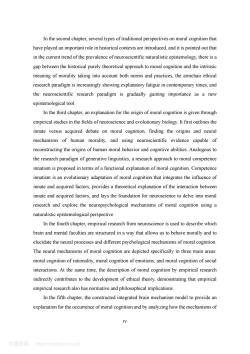
In the second chapter,several types of traditional perspectives on moral cognition that have played an important role in historical contexts are introduced,and it is pointed out that in the current trend of the prevalence of neuroscientific naturalistic epistemology,there is a gap between the historical purely theoretical approach to moral cognition and the intrinsic meaning of morality taking into account both norms and practices,the armchair ethical research paradigm is increasingly showing explanatory fatigue in contemporary times,and the neuroscientific research paradigm is gradually gaining importance as a new epistemological tool. In the third chapter,an explanation for the origin of moral cognition is given through empirical studies in the fields of neuroscience and evolutionary biology.It first outlines the innate versus acquired debate on moral cognition,finding the origins and neural mechanisms of human morality,and using neuroscientific evidence capable of reconstructing the origins of human moral behavior and cognitive abilities.Analogous to the research paradigm of generative linguistics,a research approach to moral competence innatism is proposed in terms of a functional explanation of moral cognition.Competence innatism is an evolutionary adaptation of moral cognition that integrates the influence of innate and acquired factors,provides a theoretical explanation of the interaction between innate and acquired factors,and lays the foundation for neuroscience to delve into moral research and explore the neuropsychological mechanisms of moral cognition using a naturalistic epistemological perspective In the fourth chapter,empirical research from neuroscience is used to describe which brain and mental faculties are structured in a way that allows us to behave morally and to elucidate the neural processes and different psychological mechanisms of moral cognition The neural mechanisms of moral cognition are depicted specifically in three main areas moral cognition of rationality,moral cognition of emotions,and moral cognition of social interactions.At the same time,the description of moral cognition by empirical research indirectly contributes to the development of ethical theory,demonstrating that empirical empirical research also has normative and philosophical implications. In the fifth chapter,the constructed integrated brain mechanism model to provide an explanation for the occurrence of moral cognition and by analyzing how the mechanisms of 中国知网https://www.cnk.ne
IV In the second chapter, several types of traditional perspectives on moral cognition that have played an important role in historical contexts are introduced, and it is pointed out that in the current trend of the prevalence of neuroscientific naturalistic epistemology, there is a gap between the historical purely theoretical approach to moral cognition and the intrinsic meaning of morality taking into account both norms and practices, the armchair ethical research paradigm is increasingly showing explanatory fatigue in contemporary times, and the neuroscientific research paradigm is gradually gaining importance as a new epistemological tool. In the third chapter, an explanation for the origin of moral cognition is given through empirical studies in the fields of neuroscience and evolutionary biology. It first outlines the innate versus acquired debate on moral cognition, finding the origins and neural mechanisms of human morality, and using neuroscientific evidence capable of reconstructing the origins of human moral behavior and cognitive abilities. Analogous to the research paradigm of generative linguistics, a research approach to moral competence innatism is proposed in terms of a functional explanation of moral cognition. Competence innatism is an evolutionary adaptation of moral cognition that integrates the influence of innate and acquired factors, provides a theoretical explanation of the interaction between innate and acquired factors, and lays the foundation for neuroscience to delve into moral research and explore the neuropsychological mechanisms of moral cognition using a naturalistic epistemological perspective. In the fourth chapter, empirical research from neuroscience is used to describe which brain and mental faculties are structured in a way that allows us to behave morally and to elucidate the neural processes and different psychological mechanisms of moral cognition. The neural mechanisms of moral cognition are depicted specifically in three main areas: moral cognition of rationality, moral cognition of emotions, and moral cognition of social interactions. At the same time, the description of moral cognition by empirical research indirectly contributes to the development of ethical theory, demonstrating that empirical empirical research also has normative and philosophical implications. In the fifth chapter, the constructed integrated brain mechanism model to provide an explanation for the occurrence of moral cognition and by analyzing how the mechanisms of
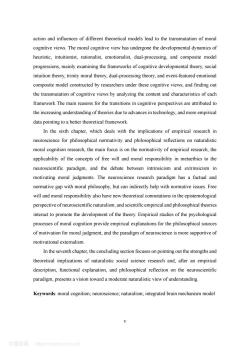
action and influences of different theoretical models lead to the transmutation of moral cognitive views.The moral cognitive view has undergone the developmental dynamics of heuristic,intuitionist,rationalist,emotionalist,dual-processing.and composite model progressions,mainly examining the frameworks of cognitive developmental theory,social intuition theory,trinity moral theory,dual-processing theory,and event-featured emotional composite model constructed by researchers under these cognitive views,and finding out the transmutation of cognitive views by analyzing the content and characteristics of each framework The main reasons for the transitions in cognitive perspectives are attributed to the increasing understanding of theories due to advances in technology,and more empirical data pointing to a better theoretical framework In the sixth chapter,which deals with the implications of empirical research in neuroscience for philosophical normativity and philosophical reflections on naturalistic moral cognition research,the main focus is on the normativity of empirical research,the applicability of the concepts of free will and moral responsibility in metaethics to the neuroscientific paradigm,and the debate between intrinsicism and extrinsicism in motivating moral judgments.The neuroscience research paradigm has a factual and normative gap with moral philosophy.but can indirectly help with normative issues.Free will and moral responsibility also have new theoretical connotations in the epistemological perspective of neuroscientific naturalismand scientificempirical and philosophical theories interact to promote the development of the theory.Empirical studies of the psychological processes of moral cognition provide empirical explanations for the philosophical sources of motivation for moral judgment,and the paradigm of neuroscience is more supportive of motivational externalism In the seventh chapter,the concluding section focuses on pointing out the strengths and theoretical implications of naturalistic social science research and,after an empirical description,functional explanation,and philosophical reflection on the neuroscientific paradigm,presents a vision toward a moderate naturalistic view of understanding. Keywords:moral cognition;neuroscience;naturalism;integrated brain mechanism model
V action and influences of different theoretical models lead to the transmutation of moral cognitive views. The moral cognitive view has undergone the developmental dynamics of heuristic, intuitionist, rationalist, emotionalist, dual-processing, and composite model progressions, mainly examining the frameworks of cognitive developmental theory, social intuition theory, trinity moral theory, dual-processing theory, and event-featured emotional composite model constructed by researchers under these cognitive views, and finding out the transmutation of cognitive views by analyzing the content and characteristics of each framework The main reasons for the transitions in cognitive perspectives are attributed to the increasing understanding of theories due to advances in technology, and more empirical data pointing to a better theoretical framework. In the sixth chapter, which deals with the implications of empirical research in neuroscience for philosophical normativity and philosophical reflections on naturalistic moral cognition research, the main focus is on the normativity of empirical research, the applicability of the concepts of free will and moral responsibility in metaethics to the neuroscientific paradigm, and the debate between intrinsicism and extrinsicism in motivating moral judgments. The neuroscience research paradigm has a factual and normative gap with moral philosophy, but can indirectly help with normative issues. Free will and moral responsibility also have new theoretical connotations in the epistemological perspective of neuroscientific naturalism, and scientific empirical and philosophical theories interact to promote the development of the theory. Empirical studies of the psychological processes of moral cognition provide empirical explanations for the philosophical sources of motivation for moral judgment, and the paradigm of neuroscience is more supportive of motivational externalism. In the seventh chapter, the concluding section focuses on pointing out the strengths and theoretical implications of naturalistic social science research and, after an empirical description, functional explanation, and philosophical reflection on the neuroscientific paradigm, presents a vision toward a moderate naturalistic view of understanding. Keywords: moral cognition; neuroscience; naturalism; integrated brain mechanism model
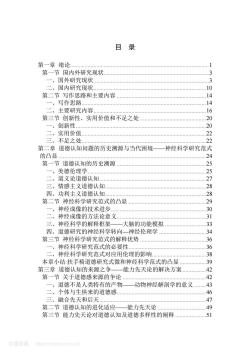
目录 第一章绪论 第一节国内外研究现状 一、国外研究现状 二、国内研究现状 10 第二节写作思路和主要内容 一、写作思路 14 二、主要研究内容 16 第三节创新性、实用价值和不足之处 20 一、创新性 20 二、实用价值 三、不足之处 .22 第二章道德认知问题的历史溯源与当代困境 神经科学研究范式 的马品 24 第一节道德认知的历史溯源 25 一、美德伦理学 25 二、 道义论道德认知 27 三、情感主义道德认知 .28 四、功利主义道德认知 28 第二节神经科学研究范式的凸显 29 一、 神经成像的技术进步 .30 二、 神经成像的方法论意义 31 、 神经科学的解释框架 大脑的功能模拟 ,33 四、道德研究的神经科学转向一神经伦理学 34 第三节神经科学研究范式的解释优势 6 一、神经学研究节式的以要件 36 神经科学研究范式对应用伦理的影响 8 本章小结:扶手椅道德研究式微和神经科学范式的凸显 39 第三章道德认知的来源之争 能力先天论的解决方案 .42 第一节关于道德感来源的争论 42 道德不是人类特有的产物 动物神经解剖学的意义.43 二、个体与生俱来的道德感 46 三、融合先天和后天 .47 第二节道德认知的进化适应 能力先天金 .49 第三节能力先天论对道德认知及道德多样性的阐释, 51 中国知网 www.cnki.ne
目 录 第一章 绪论.1 第一节 国内外研究现状.3 一、国外研究现状.3 二、国内研究现状.10 第二节 写作思路和主要内容 .14 一、写作思路.14 二、主要研究内容.16 第三节 创新性、实用价值和不足之处 .20 一、创新性.20 二、实用价值.22 三、不足之处.22 第二章 道德认知问题的历史溯源与当代困境——神经科学研究范式 的凸显.24 第一节 道德认知的历史溯源 .25 一、美德伦理学.25 二、道义论道德认知.27 三、情感主义道德认知.28 四、功利主义道德认知.28 第二节 神经科学研究范式的凸显 .29 一、神经成像的技术进步.30 二、神经成像的方法论意义.31 三、神经科学的解释框架——大脑的功能模拟 .33 四、道德研究的神经科学转向—神经伦理学 .34 第三节 神经科学研究范式的解释优势 .36 一、神经科学研究范式的必要性.36 二、神经科学研究范式对应用伦理的影响.38 本章小结:扶手椅道德研究式微和神经科学范式的凸显 .39 第三章 道德认知的来源之争——能力先天论的解决方案.42 第一节 关于道德感来源的争论 .42 一、道德不是人类特有的产物——动物神经解剖学的意义 .43 二、个体与生俱来的道德感.46 三、融合先天和后天.47 第二节 道德认知的进化适应——能力先天论 .49 第三节 能力先天论对道德认知及道德多样性的阐释 .51

一、能力先天性的理论内涵 二、能力先天论的合法性论证 .54 三、能力先天论对道德认知的阐释及其意义 58 本章小结:道德认知的能力先天性解释为神经科学实证研究奠基.61 第四章道德认知的神经机制 神经科学对认知过程的描述与解释 64 第一节神经科学对道德大脑的探索 64 第二节道德认知的神经机制 68 一、 理性道德认知 69 二、感性道德认知 74 三、道德认知与社会互动 78 第三节道德认知过程中的相互作用 .82 一、情绪和理性的关系 82 二、动态协作的道德认知 .85 第四节探索道德认知神经机制实证研究的哲学意义 .87 一、为道义论和功利主义之争拓宽研究视角】 88 、神经科学实证研究的规范含义 0 本章小结:实证研究的结果加深对道德认知的认识 92 第五章道德认知观的嬗变 -基于整合脑机制模型的演进.94 第一节大脑结构的功能模拟- .一位一体的首德认知现 95 一、结构模拟带来的三类道德内容 6 二、三位一体道德观对于道德认知的解释 99 三、三位一体的道德认识强调情境和文化的作用」 .102 第二节向内拓展的道德认知观 一对道德认知影响因素的考察 .103 一、理性主义的道德认知 .103 二、情绪主导的道德认知.。 .107 三、双重径路的道德认知 110 第三节复合模式的道德认知 一种动态系统 .113 一、对先前道德认知理论的质疑 114 二、EFEC复合模型对道德认知的解释 117 三、复合模式道德认知的优势 作为一种动态系统 120 第四节复合模型道德认知进路的哲学意蕴 .123 为功利主义和道义论之争提供新的解决方案 123 二、对“是-应该(1s-ought)”问题的回应.。 .124 本章小结:对道德大脑的深入研究推动了道德认知观的转变 125 第六章神经科学道德认知研究的哲学反思, 128 第一节神经科学道德认知研究的哲学意蕴 .128
一、能力先天性的理论内涵.51 二、能力先天论的合法性论证.54 三、能力先天论对道德认知的阐释及其意义 .58 本章小结:道德认知的能力先天性解释为神经科学实证研究奠基.61 第四章 道德认知的神经机制——神经科学对认知过程的描述与解释 .64 第一节 神经科学对道德大脑的探索 .64 第二节 道德认知的神经机制 .68 一、理性道德认知.69 二、感性道德认知.74 三、道德认知与社会互动.78 第三节 道德认知过程中的相互作用 .82 一、情绪和理性的关系.82 二、动态协作的道德认知.85 第四节 探索道德认知神经机制实证研究的哲学意义 .87 一、为道义论和功利主义之争拓宽研究视角 .88 二、神经科学实证研究的规范含义.90 本章小结:实证研究的结果加深对道德认知的认识 .92 第五章 道德认知观的嬗变——基于整合脑机制模型的演进.94 第一节 大脑结构的功能模拟——三位一体的道德认知观 .95 一、结构模拟带来的三类道德内容.96 二、三位一体道德观对于道德认知的解释.99 三、三位一体的道德认识强调情境和文化的作用 .102 第二节 向内拓展的道德认知观——对道德认知影响因素的考察 .103 一、理性主义的道德认知.103 二、情绪主导的道德认知.107 三、双重径路的道德认知.110 第三节 复合模式的道德认知——一种动态系统 .113 一、对先前道德认知理论的质疑.114 二、EFEC 复合模型对道德认知的解释.117 三、复合模式道德认知的优势——作为一种动态系统 .120 第四节 复合模型道德认知进路的哲学意蕴 .123 一、为功利主义和道义论之争提供新的解决方案 .123 二、对“是-应该(Is-ought)”问题的回应.124 本章小结:对道德大脑的深入研究推动了道德认知观的转变.125 第六章 神经科学道德认知研究的哲学反思 .128 第一节 神经科学道德认知研究的哲学意蕴 .128
按次数下载不扣除下载券;
注册用户24小时内重复下载只扣除一次;
顺序:VIP每日次数-->可用次数-->下载券;
- 《运动解剖学》课程文献资料(脑科学)基于混合式教学的中医内科学学习策略探究_于鹏龙.pdf
- 《运动解剖学》课程文献资料(脑科学)基于混合学习的生物科学专业学生学习风格研究以唐山师范学院为例.pdf
- 《运动解剖学》课程文献资料(脑科学)基于学本评估”理论的混合学习评价活动设计研究.pdf
- 《运动解剖学》课程文献资料(脑科学)基于学习科学的“以学为中心”教学研究与实践_刘庆华.pdf
- 《运动解剖学》课程文献资料(脑科学)后疫情时代人类学习的未来趋向系统科学的哲学思考.pdf
- 《运动解剖学》课程文献资料(脑科学)创新思维的脑生理、心理协同发生机制探析.pdf
- 《运动解剖学》课程文献资料(脑科学)共同富裕视域下分配公平对幸福感的影响因果推断与机器学习在社会科学中的融合应用.pdf
- 《运动解剖学》课程文献资料(脑科学)从脑科学诠释体育运动提升学习效益的理论与实践_周成林.pdf
- 《运动解剖学》课程文献资料(脑科学)从STEM到STEAM脑科学基础及教育启示.pdf
- 《运动解剖学》课程文献资料(脑科学)《非常规教学法:脑科学实用观促进学习》(第三、四章)翻译实践报告.pdf
- 《运动解剖学》课程文献资料(脑科学)《非常规教学法:脑科学实用观促进学习》(第一、二章)翻译实践报告.pdf
- 《运动解剖学》课程教学资源(文献资料)心脏与骨骼肌Smyd1及其运动干预研究进展.pdf
- 山东理工大学:《运动解剖学》课程教学资源(授课教案,共二十八课次).pdf
- 《运动解剖学》课程文献资料(脑科学)运动促进大脑健康:来自行为和脑科学的证据_金鑫虹.pdf
- 《运动解剖学》课程文献资料(脑科学)迁移学习及其在固体地球科学中的应用.pdf
- 《运动解剖学》课程文献资料(脑科学)跨学科开启头脑风暴促进脑科学交叉与融合.pdf
- 《运动解剖学》课程文献资料(脑科学)认知神经科学视域下中学小说整本书阅读教学方法研究.pdf
- 《运动解剖学》课程文献资料(脑科学)英国教育神经科学:缘起、发展与反思.pdf
- 《运动解剖学》课程文献资料(脑科学)自我决定理论视角下小学科学游戏化学习中学生学习投入研究.pdf
- 《运动解剖学》课程文献资料(脑科学)美国以学生为中心”的大学教学设计模式和教学方法研究.pdf
- 《运动解剖学》课程文献资料(脑科学)基于科创竞赛的科学教育:学习环境、学习过程与培养效果.pdf
- 《运动解剖学》课程文献资料(脑科学)基于科学探究能力发展的项目式学习在中学生物学教学中的实践研究.pdf
- 《运动解剖学》课程文献资料(脑科学)基于突触可塑性的复杂系统中信息传输机制的研究.pdf
- 《运动解剖学》课程文献资料(脑科学)基于翻转课堂的小学科学项目式学习活动设计研究.pdf
- 《运动解剖学》课程文献资料(脑科学)基于脑科学的微课教学设计探索.pdf
- 《运动解剖学》课程文献资料(脑科学)基于项目化学习培养科学思维能力的实践研究以高中生物学探究实验为例.pdf
- 《运动解剖学》课程文献资料(脑科学)基于项目式学习的科学教育领域跨学科概念建构.pdf
- 《运动解剖学》课程文献资料(脑科学)建筑的神经科学研究——缘起、内容与工具_周祥.pdf
- 《运动解剖学》课程文献资料(脑科学)教育文化视域下学习科学的研究趋势_李凤营.pdf
- 《运动解剖学》课程文献资料(脑科学)教育神经科学视域下的高中物理教学设计研究以静电场及其应用”为例.pdf
- 《运动解剖学》课程文献资料(脑科学)教育神经科学视角下小学汉字学习的教学设计与运用.pdf
- 《运动解剖学》课程文献资料(脑科学)核心素养视域下小学科学学习活动设计思路及模型搭建.pdf
- 《运动解剖学》课程文献资料(脑科学)混合学习环境下高校课堂论证式教学研究.pdf
- 《运动解剖学》课程文献资料(脑科学)焦虑的脑科学研究与临床应用进展.pdf
- 《运动解剖学》课程文献资料(脑科学)结合脑科学的生物学学科核心素养培养策略.pdf
- 《运动解剖学》课程文献资料(脑科学)脑科学与五育融合:劳动教育的审美功能.pdf
- 《运动解剖学》课程文献资料(脑科学)跨学科开启头脑风暴_促进脑科学交叉与融合_蒲慕明.pdf
- 《运动解剖学》课程教学资源(文献资料)基于肌肉激活度的关节运动角度分层预测.pdf
- 《运动解剖学》课程教学资源(文献资料)身体功能训练在肩关节运动功能恢复中的应用研究——以优秀男子举重运动员SLAP损伤个案为例.pdf
- 《运动解剖学》课程教学资源(文献资料)运动干预对髌股关节疼痛综合征的康复效果研究.pdf
